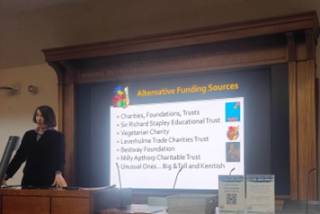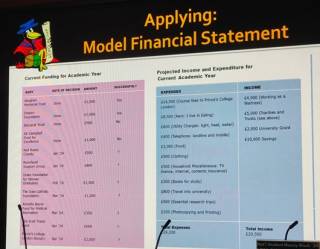Applying for a postgrad? Our top tips to securing alternative forms of funding!
26 March 2024
Are you dreaming of pursuing a postgraduate degree but having financial constraints? You're definitely not alone. VPEE Student Writer, Michelle Yosephine Rasari, discusses, 'How to fund your postgraduate degree'.

As part of its National Student Money Week campaign, on Thursday 7 March 2024, UCL’s Student Funding Team organised a seminar called “How to Fund Your Postgraduate Degree”, inviting Dr Luke Blaxill, co-director of GradFunding and Josh Du Sautoy, UCL’s Student Funding Manager.
During our post-event interview, Josh highlighted concerns around the current economic situation in the UK and postgraduate student funding:
“While the PG Loan from Student Finance England can help with the majority of tuition fee costs, we’re concerned that with the rising cost of living, students need to be prepared for the additional funding they’ll need to have as, unlike their undergraduate loans which already have a maintenance component, the PG loan does not. I felt Dr Luke Blaxill did a great job, and I hope students will follow his message, and I wish them success in applying for PG funding!”
I agree with Josh, Luke was brilliant.
Luke highlighted the alternative sources aside from postgraduate loans and university scholarships that could be an option for students without contractual obligations. From my personal experience, I have applied for more than 10 types of funding and eventually succeeded in securing one scholarship. I wish I had known the alternative funding sources before my struggles. So, you are lucky to find this article before your journey of applying for your postgraduate study!

Aligning my experience and Luke’s presentation, securing a full scholarship may appear as the safest route, yet it's also the most challenging. On the other hand, postgraduate loans offer a relatively accessible option and, as Josh previously posited, they do not cover all living expenses and are exclusively available to UK and EU students. Recognising these limitations, Luke introduced a range of diverse and adaptable alternatives, such as grants from charities, trusts, and foundations. This recommendation resonates with his own journey when he was seeking funding for his doctoral degree.
Interestingly, numerous foundations, charities and trusts exist but are not commonly known. For example, a Vegetarian Charity, Funds for Women Graduates, The Aziz Foundation for British Muslims, and many more. These funding sources are very specific and might be viable options for those who have the same values and objectives as them.
Furthermore, the seminar emphasised the importance of having a solid financial plan, which is crucial for granters to understand how candidates intend to utilise the funds. Additionally, candidates were encouraged to include any additional financial support from other granters in their financial statements. This is one of the model financial statements that I took from Luke’s presentation.

Luke wrapped up the seminar by emphasising the importance of following his golden rules to effectively secure postgraduate funding:
Luke’s top tips
- Firstly, ensure that you meet the necessary requirements. Typically, various foundations, charities, and trusts have specific eligibility criteria, such as gender, religion, or research interests. It's crucial to ensure that these align with your own. Equally important is understanding the necessary documentation, such as financial statements and personal statements, that candidates need to provide.
- Next, grasp the priorities of the funding organisation and customise your application accordingly.
- Keep your research or application straightforward.
- Demonstrate how your research could positively impact society.
- Develop a clear career path and present a well-defined financial strategy.
- Above all, maintain perseverance and never lose hope!
Josh also conveys an important message for those who intend to get a scholarship or bursary from UCL:
“Most of UCL’s bursaries and scholarships for postgraduate study have June/July deadlines, so it’s best to prepare with that kind of time-frame. I’d advise students to start compiling lists of charities and funding organisations to apply to in January before your course starts, as that will leave you plenty of time to get your applications in.”
Finally, for more guidance to support your finances and budgeting for your studies, you can contact the UCL Students’ Union. You should also take the opportunity to access the Alternative Guide to Post Graduate Funding database which is free to access with your UCL email address.
Say goodbye to funding worries for your postgrad journey - we've got you covered! Take charge now and seize your opportunity. Best of luck!
More useful information
- Tips to manage your money
- Contact UCL Student Funding Advisors via askUCL
- Financial support from UCL
- Manage your money
- Alternative Guide to Post Graduate Funding database
 Close
Close

